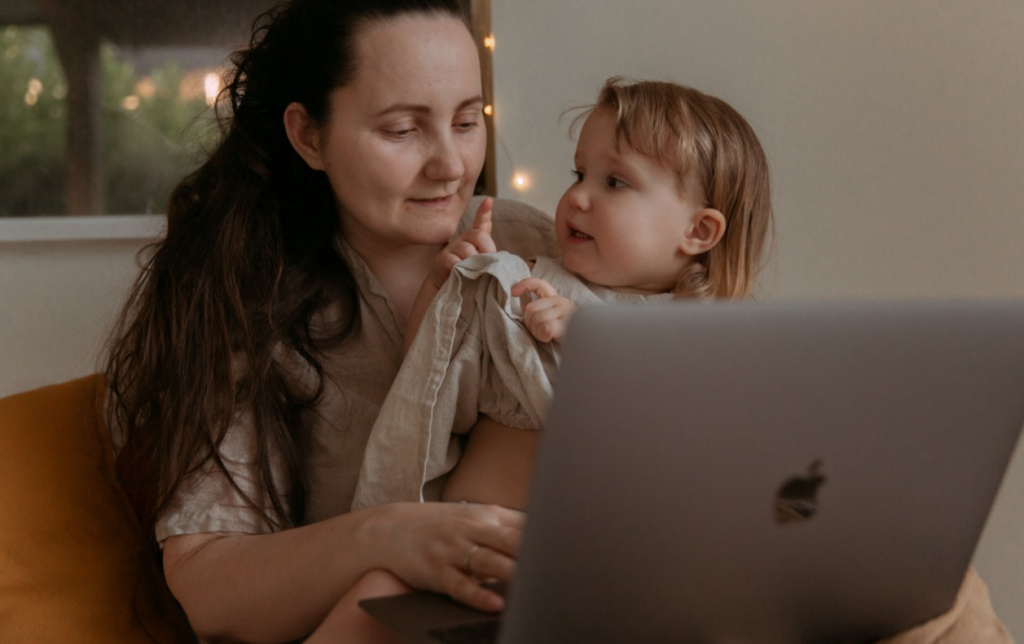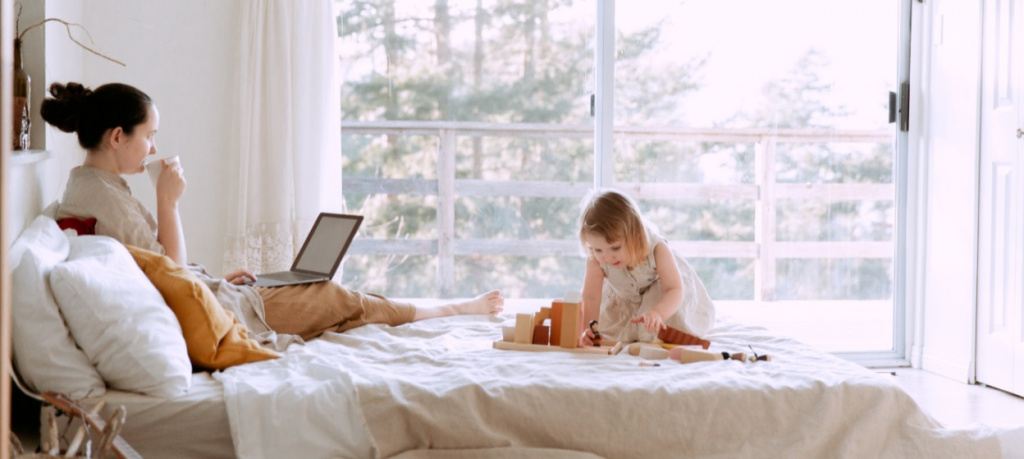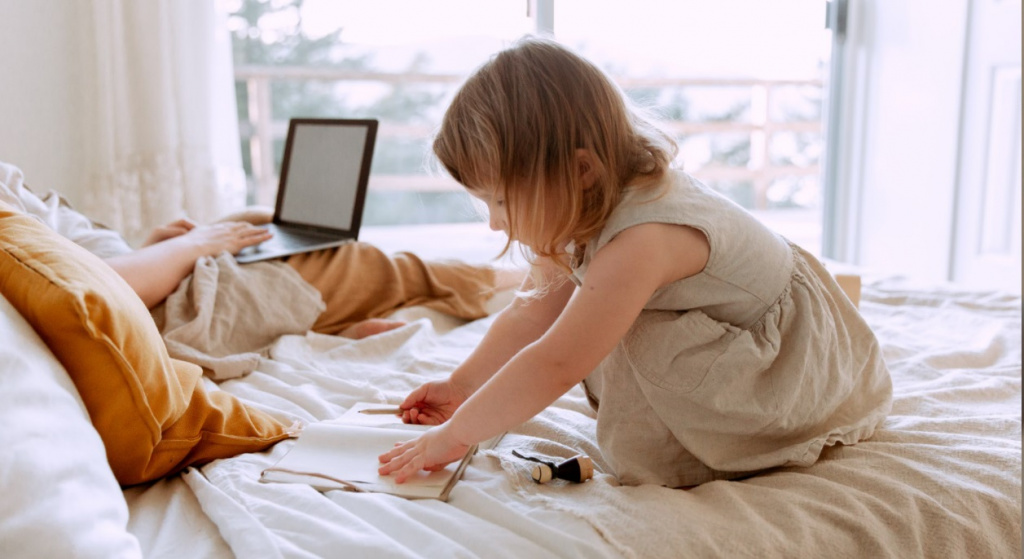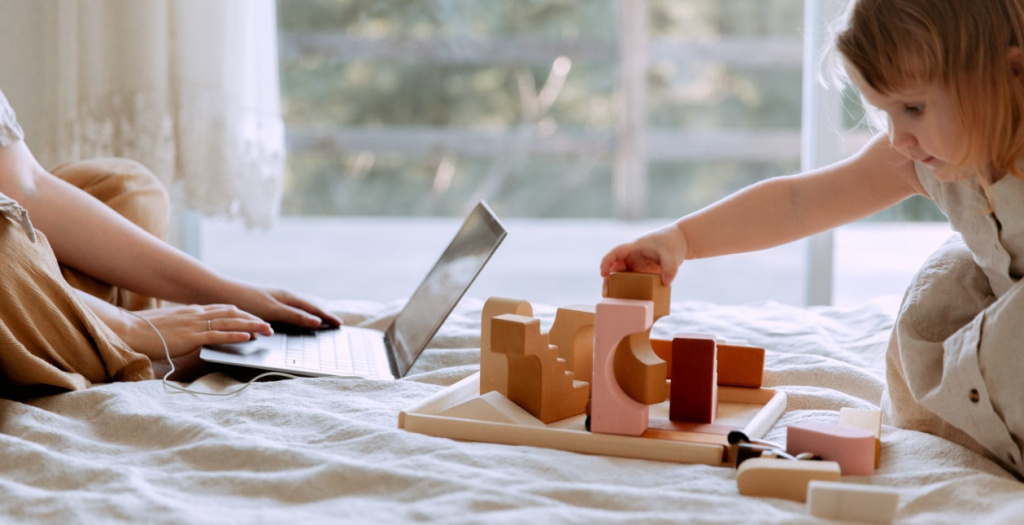A year in: Stories of Working Mothers through Covid
If you are a working mother, then the odds are high that you’ve found the past year challenging. Perhaps you’ve been dealing with job insecurity through being furloughed or redundancy, or it’s been harder to get freelance work. You may well have been trying to keep performing at work according to old norms, while juggling home-schooling. Odds are, whatever your circumstances, you’re pretty tired at this point in time. More so than usual, anyway.
This is not to say that the issues above are unique to women, but studies consistently point towards women shouldering more of the domestic load than men, and various reports suggest that this pattern has borne out in the Covid period, making the past year especially fraught for mothers.

According to McKinsey’s 2020 Women in the Workplace study1, despite companies’ efforts to support employees during the crisis, women are feeling more exhausted, burned out, and under pressure than men are.
And according to a survey conducted in July 2020 of 19,950 mothers and pregnant women by Pregnant then Screwed3, 72% of mothers have had to work fewer hours because of childcare issues. The report further notes: of the employed mothers surveyed, 81% said they need childcare to be able to work, but 51%do not have the necessary childcare in place to enable them to do their job.
The picture emerging is that Covid-19 is setting back women’s progress in the workplace.
And according to PWC’s2 most recent annual Women in Work Index – published in March 2021 – progress for women in work across 33 OECD countries could be back at 2017 levels by the end of 2021 as a result of the pandemic.
In the UK, PWC2 explains, the full impact of job losses from Covid-19 cannot yet be properly calculated due to job retention schemes, but furlough data shows that women are at greater risk of losing their jobs when these schemes come to an end.
Stories from women working in insights interviewed for this article – client-side and agency-side, working mothers and pregnant, actively working and between jobs or on maternity leave – show a wide variety of experiences, with much nuance in what informs how challenging the past year has been.
This is already an insight, as Vanessa, one of the interviewees, notes: ‘I think it’s been a hugely diverse experience. People’s circumstances can vary a lot. Variables that affect your situation include your work culture, your relationship with your team and line-manager, the cadence of your work, whether you’re client-facing or not, your relationship with your partner, the age of your kids, whether your kids have special educational needs, whether you have childcare support’.
Vanessa adds that this complex variety in people’s circumstances and experiences makes it hard to generalise about parents’ experiences and serves as a watch-out for managers not to assume that their experiences also hold true for their teams.
Of course, not every household falls into traditional gender norms where women shoulder the brunt of the childcare. Amongst our interviewees, we have had parents of blended families, and a mother in a gay couple. But overwhelmingly the picture is of women carrying more of the strain of the impact of Covid disruption on home life, and struggling as a result.
As Vanessa adds: ‘What feels universal is that all the mothers I know feel like they’re failing at everything – as a parent, as a teacher, and at work’.
Lisa adds: ‘It’s been a situation of just trying not to drop any balls. I’ve not dropped balls at work, but that’s come at the expense of home life’.
Several themes have emerged across discussions.

The importance of companies signalling understanding of the challenges and staff needs for flexibility:
Vanessa commented that she felt hugely supported by her company sending out signals that it recognised that working parents would be finding things hard, and would need to take time to work out how to navigate the period – and keep adjusting as needed.
‘Right from the start, they never questioned that I could be trusted to manage my workload and only do as much as I could. They asked that I be transparent about what I could and couldn’t do, and be open to teams about when I could be contacted, and what to expect of me’.
Lisa notes: ‘Just getting that recognition from our management that it’s tough, and knowing there was permission not to have to pretend that it’s all fine felt really important to me’.
Lucy adds: ‘We’re flexible at work anyway, but they did make it clear that it’s about getting the job done and it doesn’t matter when. You can take time off in the day’.
But Lucy’s experience – and that of several others interviewed – highlighted a challenge many saw in their businesses: how to offer flexibility while navigating what for many was a busy period. How to sensibly and fairly balance business priorities with human needs. And overall, interviewees were sympathetic to the challenges their employers faced in this respect.

The importance of supporting people’s boundaries:
A red thread throughout discussions is how work and home life have collided and disrupted schedules, often requiring late-night work or early starts to get enough done. Changing lockdown dynamics and the sheer unpredictability of this period (will my child suddenly be sent home from nursery with possible Covid?) make it hard to sustain boundaries and any semblance of healthy balance.
What has come through is the importance of companies showing that they recognise this flux, they understand how tiring it can be for parents to be pulling very late nights to hit deadlines, and see when a reset is needed. Vanessa went to her CEO on the brink of burnout and was quietly granted extra paid leave to recuperate.
It was also clear that mothers have needed their companies to support them more proactively in setting boundaries wherever possible, to prevent burnout. Role-modelling from seniors was seen to be key here.
Sophie notes – ‘I need thinking time, and I’m not getting that on my commute any more. If my work is stretching to fill the evenings all the time, there’s a problem. I experienced a manager putting 6pm meetings in my diary. It’s easy to do. There weren’t boundaries or a respect for work-life balance’.
And Melissa adds – ‘I was often getting my kids in bed and working till 11pm, 1am. Client deadlines needed to be hit. On reflection I really would have benefitted from cutting back my hours but I was advised not to do that to avoid taking the salary sacrifice. I don’t think that was the best advice’.

The importance of role-modelling and active empathy:
The presence of seniors who are demonstrating that they are needing to adapt their workloads and ways of working to deal with children at home is felt to play a role in offering permission to take the flexibility you need.
Conversely, and bearing in mind the variability in people’s circumstances, having colleagues or seniors who assume that their experience can be reflected onto yours can be alienating and upsetting.
As Marie says, ‘I had male colleagues who said – “just get up at 7am to plan your day, do a meal plan”’ – which is fine for them to say but they weren’t the ones actually having to do that in their homes. And that sort of advice is hopeless when you have an 18-month-old’.
Lucy adds: ‘Our senior team said it’s really hard – I thought, it’s not the same for you as your wife. I didn’t see them doing half the stuff I did’.
Of course, it’s not always possible to find directly relevant role-models, and it shouldn’t in principle require people to have children to grasp the challenges in lockdown of those who do.
Marie adds ‘It was actually a senior director who doesn’t have kids who’s been the most useful. She’s actively checked in with me and others, she’s been really on it. She seems to understand the challenges’.
It can be hard for those who don’t actively see understanding from their seniors or role-modelling of dealing with childcare in this period to know how to behave. What is acceptable? What will be judged negatively?
Jo notes: ‘In my old company, I knew we were all going through it. Now, I don’t see people’s kids, I don’t know what the etiquette is. Should I keep my daughter hidden? Does it make me less professional if I have to step in to wipe her bum?’.
Here, it’s also evident that just as people’s experiences vary greatly, so do their line-managers’ responses to the situation. Where companies had proactive and supportive HR professionals, people seemed to fare better than those where the onus of how to help employees falls predominantly to managers.

Recognising the cumulative effects
Several commented on the toll a year of Covid had taken.
Anna spoke about a sense of PTSD, of having gone through a trauma. Kerry talked about having reached a point of desperation for time off, which Anna echoed – ‘I’m going to give it a few more months and then see if I can take time off. On my own. I just really need a break’.
Lisa also reflected on how the working patterns had left her feeling in a permanent fog: ‘The other big thing for me is that I felt like I had a foggy head constantly and I still feel like it now. The irregular patterns of work, doing the thinking in the evening, working till 1 at night, then I can’t sleep. I’m just exhausted’. It’s important to note here that this sense of ‘fog’ and related concerns about underperformance at work can leave women feeling guilty and anxious their careers may have suffered set-backs due to this period.
There was a recognition that ‘TOIL’ is useful, but for those most worn down by the past year’s experiences, it may not be enough – more is needed to recharge and reset, even if the solutions are not always readily apparent.
The little things do matter, as long as they’re not fleeting gestures
Clearly, token gestures to support working parents through the Covid period will never be enough, but thoughtful little touches can go a long way. What seems to be playing in here is the idea that the business has considered what could make a difference. And the very fact of making an effort with these small gestures can signal care.
Vanessa says – ‘They gave us Cook vouchers for parents early on in the pandemic. Things like that were really appreciated’. Another company had given all staff additional pay each month due to efficiencies made through keeping the office closed.
Equally, the moments where managers proactively reach out to check on staff wellbeing on an individual basis, or the repeated messages that acknowledged that times were tough and the company was there to support, all played an important role for people emotionally.
And lastly, the recognition of what specifically can be addressed to make the ‘WFH’ experience less tiring, and attempts to encourage healthier behaviours, were welcomed – such as encouraging lunch-breaks, or calls away from Zoom.
So what next? Over a year into the pandemic, in spite of huge flux over this year, many have adapted to new ways of working and are finding it hard to see what a post-Covid working world might look like.

A desire for ongoing flexibility
Consistently, working mothers want to sustain whatever flexibility they can as appropriate to their work and home lives.
Jo says: ‘I’m clear that working from home is the future. I changed jobs in lockdown. I knew that my old company would want everyone back in the office post-Covid. They’re not flexible. Seeing that so clearly, and thinking about how long my commute used to be – I realised I’d never see my daughter. That marked the end of my time there’.
There’s a hope that a more flexible ongoing way of working will support families in dividing childcare tasks better going forward, and having a shared understanding. Jo adds ‘I can understand the life of my partner better now because I can see how she’s spending her time in maternity leave. It gives me empathy for what she’s going through’.
This flexibility is understood to be beneficial for everyone. Camilla comments: ‘I wonder how Covid has affected those who don’t have kids? Have they had to pick up more work for those who do? People can have other responsibilities in their lives, like caring for family members. If Covid nudges businesses to be more flexible for everyone, then that would be a fundamentally good thing’.
The danger of losing women from the industry, or simply from their roles
Some of the women interviewed for this article were clearly scarred from the past year, and exhausted.
Jo had moved jobs to go client-side, recognising she needed a more flexible environment. Camilla was contemplating such a move, but struggling to see this as something that really fits with her passions at work – ‘I’ve started to think – do I need to look for a client-side role? With the right thing, could it be an easier life, could it be more flexible? But I’ve always been so driven and enjoy the substance of what I do’.
Melissa found that Covid had left her feeling that she didn’t have a future in the industry – ‘I read a lot about key workers and really reflected on the valuable role they play in society. The challenges of the pandemic – and returning from maternity leave in this period – have come together to make me re-evaluate, and I’m going to retrain to become a nurse’.
And perhaps there’s a lesson for us all in there – however exhausted we may feel, however much we may care about our work, in the insights sector we’re not key workers. It’s extremely unlikely to be a life or death situation if we hit that deadline or send a report an hour late. And as soon as we can catch our breaths individually and collectively, there are some things to think about – what does work really mean to us? How do we want to work going forward? And how can we best manage work alongside parenting?
There are never easy answers to any of this, but perhaps over time we’ll find some benefits in how Covid has shaken up our perspectives on work.
Sources:
1https://www.mckinsey.com/featured-insights/diversity-and-inclusion/seven-charts-that-show-covid-19s-impact-on-womens-employment#
2https://www.pwc.com/gx/en/news-room/press-releases/2021/women-in-work-index-2021.html
3https://pregnantthenscrewed.com/the-covid-crisis-effect-on-working-mums/